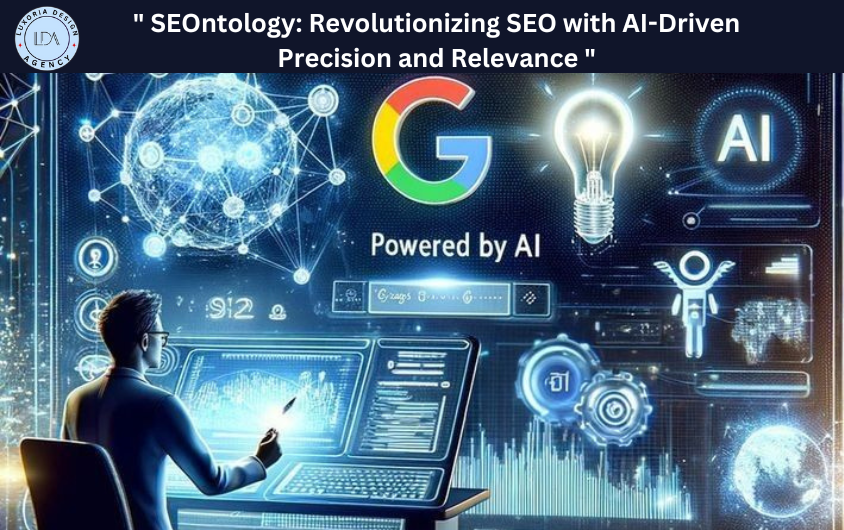Presenting SEOntology: The Next Generation of SEO in the Era of Artificial Intelligence
In the dynamic realm of digital marketing, search engine optimization (SEO) continues to be a vital component for achieving online success. As artificial intelligence (AI) becomes increasingly embedded in our digital experiences, SEO strategies must adapt accordingly. The conventional methods of SEO, which primarily emphasized keywords and backlinks, are no longer sufficient for maintaining a competitive edge. This is where SEOntology comes into play: a reimagined approach to SEO tailored for the AI-driven landscape.
SEOntology integrates traditional SEO principles with advanced AI technologies, fostering a more sophisticated, intelligent, and comprehensive strategy for website ranking. In this innovative framework, grasping context, user intent, and the interconnections among various data points is as critical as the foundational elements of SEO. Let us explore the essence of SEOntology, its significance, and its role in shaping the future of SEO.
Transitioning from Traditional SEO to SEOntology
In the initial stages of SEO, the approach was straightforward: incorporate relevant keywords, acquire backlinks, and watch your website climb the rankings. Search engines primarily assessed keyword density and backlink profiles to gauge relevance and authority. However, with the rise of AI and natural language processing (NLP), search engines like Google have evolved to become much more advanced. They can now comprehend context, intent, and the relationships among different concepts.
SEOntology acknowledges this evolution by prioritizing the semantics of content, the connections between entities, and how AI algorithms analyze and interpret information. Instead of merely optimizing for keywords, SEOntology focuses on developing a meaningful, interconnected content ecosystem that reflects the way AI and machine learning (ML) systems process and understand information.
Key Elements of SEOntology
Semantic SEO:
While traditional SEO concentrated on precise keyword matches, semantic SEO shifts the focus to the underlying meanings of words and phrases. Modern search engines leverage artificial intelligence to grasp the context and intent behind queries, even when they are articulated differently. In the realm of SEOntology, it is essential for content to be optimized to address broader inquiries and maintain contextual relevance, rather than merely being filled with keywords.
Entity Optimization:
Entities play a vital role in SEOntology. An entity can refer to a person, location, organization, or any other identifiable concept recognized by search engines. AI algorithms, such as Google’s BERT and RankBrain, heavily depend on the comprehension of entities and their interconnections. By optimizing content for entities through structured data and schema markup, websites enable search engines to better understand and rank their content based on real-world relationships rather than solely on textual content.
AI-Enhanced User Experience (UX):
With the increasing integration of AI into search algorithms, user experience (UX) has become increasingly influential in SEO. Search engines can now monitor and assess user interactions, including bounce rates, dwell time, and navigation patterns. SEOntology emphasizes the importance of prioritizing UX on websites, ensuring that visitors not only locate the information they seek but also engage meaningfully with the content.
Knowledge Graphs:
The knowledge graph serves as a database that aids search engines like Google in organizing information into facts and entities while understanding their interrelations. In the context of SEOntology, creating content that contributes to knowledge graphs is crucial. Websites that offer structured, fact-based content that integrates into knowledge graphs will gain a competitive edge in search rankings, as they assist AI systems in better organizing and presenting information.
Natural Language Processing (NLP):
AI-driven search engines are increasingly utilizing NLP to understand and analyze the intent behind user queries. SEOntology advocates for content creators to prioritize human-centric writing, emphasizing natural language over keyword-stuffed, mechanical text. Incorporating conversational language, addressing frequently asked questions, and ensuring a coherent flow of information will enhance AI’s ability to comprehend and rank content effectively.
Voice Search Optimization:
The emergence of virtual assistants such as Google Assistant, Siri, and Alexa has made voice search a significant aspect of SEO. SEOntology acknowledges the necessity of tailoring content for voice search. This requires anticipating the conversational and question-oriented nature of spoken queries. Optimizing for voice search involves focusing on long-tail keywords and employing natural language that reflects everyday speech rather than typed queries.
AI-Powered Content Creation:
The advancement of AI tools like GPT and content-generating algorithms is transforming the content creation landscape. SEOntology incorporates AI-driven content generation into its framework, utilizing these technologies to produce highly relevant and optimized content that appeals to both users and search engines. Nonetheless, human oversight remains essential to maintain quality and authenticity.
Data-Driven Insights:
AI’s capability to analyze vast amounts of data rapidly offers valuable insights into user behavior, content effectiveness, and ranking dynamics. SEOntology highlights the importance of AI-enhanced analytics tools to track SEO performance, refine strategies, and adapt to the constantly evolving search algorithms. This approach enables a more responsive, data-informed SEO strategy, where decisions are guided by real-time analytics rather than past trends
Hyper-Personalization:
Artificial intelligence is highly effective in delivering personalized experiences, customizing search results and recommendations according to individual users’ historical behavior, preferences, and geographical context. SEOntology leverages this capability by emphasizing hyper-personalized content that resonates with various audience segments. This personalization can manifest in localized content and dynamic website features that adjust in real-time based on user interactions.
Integration with Other Digital Channels:
SEOntology operates within a broader digital marketing ecosystem, seamlessly connecting with various channels such as social media, paid advertising, and email campaigns. For AI-driven SEO strategies to be effective, they must align with overall marketing initiatives to establish a cohesive digital footprint. SEOntology promotes collaboration among SEO, content marketing, and AI-enhanced advertising efforts to enhance visibility and effectiveness.
The Importance of User Intent in SEOntology
At the core of SEOntology is a deep understanding of user intent. Contemporary search engines are becoming more skilled at understanding not just the queries users input, but also the motivations that drive those inquiries. Are users seeking information, looking to make a purchase, or comparing different options?
AI algorithms, such as Google’s BERT (Bidirectional Encoder Representations from Transformers), are engineered to grasp the subtleties of user intent. SEOntology prioritizes the alignment of content with user intent by addressing inquiries, resolving issues, and providing value throughout the user journey.
The era of merely optimizing for high-traffic keywords has passed. With SEOntology, the emphasis shifts to crafting content that aligns with the specific intent of the searcher, whether that intent is informational, navigational, transactional, or investigational.
SEOntology: The Evolution of SEO
As artificial intelligence continues to evolve, the landscape of SEO will be influenced by AI’s capacity to comprehend, analyze, and process information in ways that resemble human thought processes. SEOntology signifies the natural evolution of SEO, where machine learning, natural language processing, and data-driven insights come together to formulate more intelligent and effective optimization strategies.
For businesses and digital marketers, embracing SEOntology is essential not only for keeping pace with industry changes but also for excelling in an AI-centric environment. In this new paradigm, search engines will assess pages not merely on keyword usage but on context, intent, and relevance.
Adopt SEOntology to ensure your brand leads the way in the forthcoming era of SEO, where AI and sophisticated algorithms will shape the digital environment for the foreseeable future.
conclusion
In summary, SEOntology signifies a revolutionary advancement in search engine optimization, integrating conventional SEO techniques with the innovative capabilities of artificial intelligence. By focusing on semantic comprehension, user intent, and entity optimization, this forward-thinking strategy empowers businesses to develop impactful, contextually rich content that connects with audiences and aligns with sophisticated search algorithms. As the digital landscape progresses, adopting SEOntology will be crucial for brands aiming to improve their visibility, relevance, and engagement in a highly competitive online space, ensuring they remain at the forefront in the rapidly changing realm of AI-enhanced search.



